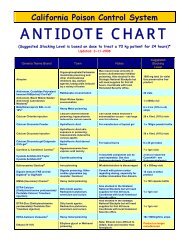KNOW YOUR PLANTS - California Poison Control System
KNOW YOUR PLANTS - California Poison Control System
KNOW YOUR PLANTS - California Poison Control System
You also want an ePaper? Increase the reach of your titles
YUMPU automatically turns print PDFs into web optimized ePapers that Google loves.
Y<br />
Latin or scientific name Common name<br />
Yucca brevifolia Joshua tree<br />
Yucca spp Dagger plant<br />
Yucca spp Spanish bayonet<br />
Yucca spp Yucca<br />
Z<br />
Latin or scientific name Common name<br />
Zanthosoma lindeni Indian kale<br />
Zebrina pendula Inch plant<br />
Zebrina pendula Wandering Jew<br />
Zinnia spp Zinnia<br />
TOXIC <strong>PLANTS</strong><br />
Introduction<br />
Plants are considered poisonous if they can cause some type of negative reaction from the<br />
exposure. Reactions can range from mild to serious, depending on the amount of the<br />
exposure. Some plants cause only a red itchy rash. Some plants cause vomiting and<br />
diarrhea. But some plants can be very dangerous and have effects on the heart, liver or<br />
kidneys.<br />
Each situation is unique. Reactions to plants can depend on factors such as the age and<br />
size of the patient, health factors such as allergies and the amount of the exposure.<br />
Always call the poison center for up-to-the-minute treatment advice.<br />
In general, plants considered poisonous to humans are likely to be poisonous to animals<br />
as well. Animals tend to eat larger amounts than humans so they may get sicker than<br />
humans from eating plants.<br />
It is essential to know the names of the plants in your house and in your yard. Keep the<br />
name tags that come with new plants attached for future identification. If your child is<br />
being cared for at a relative’s house or daycare, it is important to know if they have<br />
dangerous plants to which your child could be exposed.<br />
You must have a name of the plant (either the common name or the Latin (scientific)<br />
name) to get the most reliable specific information. <strong>Poison</strong> center staff cannot identify<br />
plants over the phone from the description of the plant. There are over 1000,000 species<br />
of plants. A call to the poison center about an unknown plant described as having big<br />
shiny green leaves is not enough information to know what the plant is. If you do not








